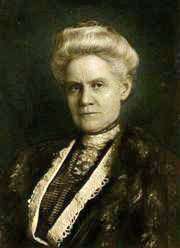Charlotte Reeve Conover
Charlotte Reeve Conover (June 14, 1855 – September 23, 1940) was an American author, lecturer, political activist, educator, and "Dayton's historian".[1][2]
Charlotte Reeve Conover | |
|---|---|
 | |
| Born | Charlotte Reeve June 14, 1855 Dayton, Ohio |
| Died | September 23, 1940 (aged 85) |
| Resting place | Woodland Cemetery and Arboretum |
| Genre | History |
Early life and education
Conover was born to physician Dr. John Charles and Emma Barlow Reeve on June 14, 1855.[1] She attended Dayton Central High School, Cooper Seminary, and the University of Geneva.[1]
Writing career
Conover wrote books about Dayton history and articles for Ladies' Home Journal, Harper's and The Atlantic. She wrote a regular column called "Mrs. Conover's Corner" for the Dayton Daily News[1] and served as editor of the Women's Page for four years.[3] Her four-volume history Dayton and Montgomery County was in 1965 considered "the most authentic public record of Dayton and its pioneer citizens."[1] She was noted for her "pioneering studies" of area history.[3]
In her later years she lost her eyesight but continued to write columns for the Dayton Daily News; friends visited to help her read, and the paper's owner and editor, Governor Cox, never knew that she was blind.[1]
Impact
In 1901 Conover martialled the Young Women's League of Dayton to take over the publication of the Dayton Daily News – known as "The Day The Women Got Out The News" – on March 30, 1901, as a fundraiser for the organization.[4] Conover was a leader of the Woman's Suffrage Party of Montgomery County. In The Importance for Women to have Suffrage: An Address before the Woman Suffrage Association she spoke of the importance of suffrage and equality of the sexes to the country's future.[2] Conover was a founder of the Dayton Woman's Literary Club and served as its fourth president, from 1895 to 1897.[1] She encouraged other writers, among them fellow Daytonian Paul Laurence Dunbar.[3]
In 1932, one of her lectures, Ramblings of an Ancient Daytonian, was reprinted in its entirety in the Dayton Daily News.[3]
The Dayton Daily News in 1940 called her "Dayton's foremost historian."[5] This obituary appeared on the front pages of the Dayton Daily News[6] and the Dayton Herald,[7] and on the editorial page of the Dayton Journal.[8] NCR chairman of the board E. A. Deeds called her "perhaps Dayton's most outstanding citizen."[5]
Personal life
Conover married lawyer Frank K. Conover on October 14, 1879.[1][9] They had four children,[1] Elizabeth Dickson, John Charles Reeve, Wilbur Dickson, and Charlotte Mary.[2]
Awards and honors
Conover was inducted into the Dayton Walk of Fame in 2007. Paul Laurence Dunbar dedicated his Lyrics of Sunshine and Shadow to her.[1] She is listed in Woman's Who's Who of America 1914–1915.
Bibliography
- Some Dayton Saints and Prophets[1]
- Concerning the Forefathers: Being A Memoir, with personal narrative and letters of two pioneers Col. Robert Patterson and Col. John Johnston (1903)[10]
- Recollections of Sixty Years By John Johnston, Indian Agent for the US Government (1915, with John Johnston)
- Memoirs of the Miami Valley (1919)[1]
- Dayton: An Intimate History[1]
- Dayton and Montgomery County (1932)[1]
- Builders in New Fields (1939)[1]
- David Gebhart, Alpha 1827 - Omega 1907: A Memory and an Appreciation
- On Being Eighty and Other Digressions
- A History of the Beck Family
- The Patterson Log Cabin
- The Story of Dayton
- Harvest of Years: Four sprightly essays
References
- Rogers, Mrs. William. "Charlotte Reeve Conover enriched a city's memories". The Journal Herald. Retrieved 16 November 2018.
- Schweikart, MLA. "Charlotte Reeve Conover". Retrieved 16 November 2018.
- "Charlotte Reeve Conover". Dayton Walk of Fame. Retrieved 16 November 2018.
- Burba, Howard. "When the Women Got Out The News". Retrieved 16 November 2018.
- "Charlotte Reeve Conover". Dayton Daily News. Retrieved 16 November 2018.
- "Leaders Pay Tributes to Memory of Mrs. Conover". Dayton Daily News. Retrieved 16 November 2018.
- "Charlotte Reeve Conover, Dayton Historian, Dead". The Dayton Herald. Retrieved 16 November 2018.
- "Charlotte Reeve Conover". The Dayton Journal. Retrieved 16 November 2018.
- "Charlotte Reeve Conover portrait". Ohio History Connection. Retrieved 16 November 2018.
- Jameson, John Franklin; Bourne, Henry Eldridge; Schuyler, Robert Livingston (1904). The American Historical Review. American Historical Association. p. 230–231. Retrieved 17 November 2018.